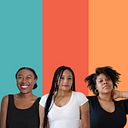I’m a Black Woman and I can’t connect with Feminism.
Maybe its the history of white woman or the modern day micro-aggressions that are making this difficult.
Luckily for Black Women, we can continue our celebrations after Black History Month into March for Women’s History Month. How did this month come to be?
Up until the 1970s, Women’s History was virtually an unknown topic in the K-12 education or in the general public. To change this, the Education Task Force of the Sonoma County (California) Commission initiated a “Women’s History Week” celebration in 1978. International Women’s Day was set on March 8th as the focal point of the observance.
After seeing the success in Sonoma County, more women decided to do special presentations honoring women in in classrooms throughout the area. In February 1980, President Carter issued the first Presidential Proclamation, making the week of March 8th National Women’s History Week. State departments of education across America encouraged National Women’s History Week as an effective means to achieving equity goals within classrooms. The increase of states declaring March as Women’s History Month was used to persuade Congress to declare the entire month of March National Women’s History Month, which passed in 1987. [Source]
It seems natural as a Black woman that you would be excited about Women’s History Month and women’s rights but I’ve always had a hard time connecting to the overall theme of feminism. This might be because historically, white women who claimed to be feminists only fought for rights for white women. Susan B. Anthony has a very racist past and Black Women did got receive the right to vote until years after white women did. The leaders of the Women’s Suffrage movement did not have Black women in mind when they were marching. White women are also the ones who stand by white men’s side to uphold white supremacy. They wrongfully accuse Black men of rape or sexual assault leading to a lot of damage in the Black community (ex. the start of the Tulsa Race Massacre and the murder of Emmitt Till).
Even modern day feminists seem to oftentimes leave Black women out of the things they are fighting for (ex: #WomenBoycott Twitter and Rose McGowan). And how can we forget the number of white women who voted for Donald Trump in both presidential elections. White women might be fighting for equal pay and abortion rights, but for Black women it goes deeper than that. We are still not even paid the same as white women or Asian women at work. What white women are fighting for we must fight with more obstacles in place.
A couple of years ago I had curated Black History Month events for my job to make sure that Black businesses could sell food to employees. I spent time speaking to each vendor and making sure money went back into the community. When Women’s History Month came, the white women who curated the events used the exact same vendors I had and received applause. Out of all the vendors in New York City, she decided to just copy the same vendor and was completely okay taking full credit for the work. Small things like this along with the micro-aggressions and the fetishization of Black bodies and culture make it hard to connect to a group that believes we are fighting for the same things.
When I walk into a room full of white women I am seen as other to them because I am Black. White women love to be the center of feminism and try to block out anyone that doesn’t fit their mold, similar to white supremacy. Until white women actually make the effort to change and practice intersexuality, I will only equate my feminism with the ones who will actually fight for me: Black women.
Personally, I know when I walk into a room, I’m seen as Black first. Then I’m seen as a woman. The glass ceiling is already there. It’s already above my head. Shattering that bitch is real tough for me. — Janae Price from So-Called Oreos
In this episode, the So-Called Oreos give a brief history on how Women’s History Month came to be. The four hosts dive into how the comments and actions of white women have caused them to feel disconnected to the overall idea of feminism. Kia tells her experience of white women copying her ideas at work and Amari shares a story on her white friend joining her for a protest and the importance of white allies showing up. Rachel gives tips on managing PTSD and reminds us how not managing our stress can take a toll on our body. The show wraps on a positive note with the friends mentioning the women they look up to.
The So-Called Oreos Podcast is available on all podcast platforms! Please support by rating, following and leaving a review!
Join us on Discord!: discord.gg/d3RrepdTdQ
So-Called Oreos Club: www.joinclubhouse.com/club/so-called-oreos
Email: socalledoreos@gmail.com
Twitter: @socalledoreos
Instagram: @socalledoreos
Facebook: www.facebook.com/socalledoreos/
YouTube: bit.ly/3nutxC2
Audience Survey: bit.ly/2vOYtH9
